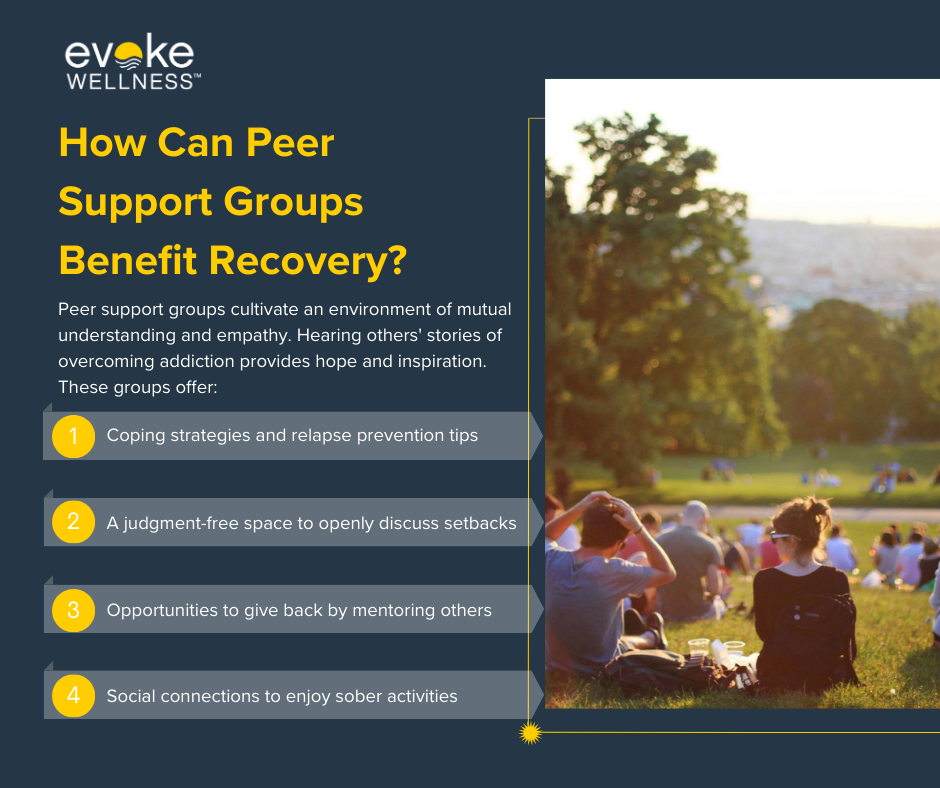The journey to recovery from addiction is often a challenging and isolating experience. However, you are not alone in this struggle. Community and peer support play a crucial role in helping individuals achieve and maintain sobriety. Recent studies have shown that individuals who participate in support groups are 50% more likely to remain abstinent after one year compared to those who do not. By embracing the power of community, you can significantly enhance your chances of long-term recovery success.
If you or a loved one is struggling, help is available today. Call (833) 969-3318 to speak with our compassionate team, or reach out online and schedule an appointment to begin a healing journey.
Why are support groups important in recovery?
Support groups play a vital role in the recovery journey, offering a safe and non-judgmental space for individuals to connect, share their experiences, and receive encouragement from peers facing similar challenges. According to the National Institute on Drug Abuse, peer support groups can significantly improve treatment outcomes and increase long-term sobriety rates.
Building a Community of Understanding
Addiction can often breed feelings of isolation and loneliness. Support groups combat this by fostering a sense of community and belonging among members. As highlighted by Evoke Wellness at Coconut Creek, developing healthy connections is crucial for sustained recovery, reducing stress and improving self-image.
Sharing Experiences and Coping Strategies
In support groups, individuals have the opportunity to openly share their struggles, triumphs, and coping mechanisms. By hearing diverse perspectives, members can gain valuable insights and learn new strategies for managing cravings, avoiding triggers, and maintaining sobriety.
Providing Accountability and Encouragement
Support groups offer a built-in system of accountability and motivation. Members can celebrate each other’s milestones, offer encouragement during difficult times, and serve as a constant reminder of the importance of perseverance in recovery.
Fostering Long-Term Sobriety
Evoke Wellness Coconut Creek recognizes the significance of support groups, making participation in sober support groups a mandatory part of all their treatment programs. This approach aims to foster a robust support network and equip individuals with the tools necessary for long-term sobriety.
Whether through in-person meetings or online forums, support groups provide a vital lifeline for individuals navigating the challenges of addiction recovery. By fostering a sense of community, sharing experiences, and offering accountability, these groups can empower individuals to maintain their sobriety and achieve lasting personal growth.
What is the importance of support in the recovery process?
A Vital Component
Support from others is a vital component of the recovery journey. Isolation and loneliness can contribute to substance abuse and increase the risk of relapse. Healthy relationships provide security, promote self-esteem, and offer acceptance – all crucial elements for sustained sobriety.
Strength in Community
Building a strong support network is key. Attending support groups, participating in group therapy, and surrounding oneself with positive individuals in recovery can decrease feelings of isolation and create a sense of community. Peer support from those with shared experiences is a powerful force in many effective treatment approaches.
Comprehensive Care
At Evoke Wellness at Coconut Creek, a continuum of care with various treatment options and aftercare programs is available to ensure individuals have the resources and support needed long-term. Personalized treatment plans address the physical, psychological, and emotional aspects of addiction recovery.
Ongoing Accountability
Support doesn’t end with initial treatment. Sober living facilities, intensive outpatient programs, and case management services provide ongoing encouragement and accountability – vital for maintaining sobriety and preventing relapse. By fostering a supportive environment, individuals gain empowerment to achieve lasting recovery.
Why is peer support important in recovery?
The Power of Shared Experience
Peer support plays a pivotal role in the recovery journey. It fosters a profound sense of belonging and understanding that can be challenging to find elsewhere. Those battling addiction often experience isolation and loneliness, which can significantly contribute to relapse. Engaging with others who have walked a similar path provides a unique form of encouragement and accountability.
Building a Supportive Network
Regular participation in support groups like Alcoholics Anonymous (AA) and Narcotics Anonymous (NA) is an effective way to build meaningful relationships with others in recovery. These groups offer a safe, judgment-free environment where individuals can share their experiences, learn coping strategies, and foster a sense of community. Peer support activities, such as group therapy, workshops, or volunteering, can further strengthen this network of supportive connections.
Overcoming Challenges Together
Peer support is particularly valuable during the early stages of recovery, when the risk of relapse is highest. Having a trusted group of individuals who understand the daily struggles can provide crucial encouragement and accountability. Peer support can help individuals identify and manage triggers, develop healthy coping mechanisms, and prevent relapse by fostering a shared understanding and mutual support.
Long-Term Sobriety and Growth
Effective addiction recovery requires a comprehensive, holistic approach that addresses the physical, psychological, and emotional aspects of the disease. Peer support and ongoing aftercare programs can provide the continuity of care and community necessary for maintaining long-term sobriety. Facilities like Evoke Wellness at Coconut Creek emphasize the importance of peer-led initiatives and alumni programs to ensure individuals have the resources and support they need to embrace a fulfilling, substance-free life.
What are three benefits of peer support?
Shared Understanding and Motivation
A profound benefit of peer support is the shared understanding that comes from lived experiences. Those in recovery can connect on a deeper level with individuals who have walked a similar path, fostering a sense of belonging and motivation. According to an Evoke Coconut Creek blog post, peer support provides valued social roles that help maintain abstinence. Hearing others’ stories and successes reinforces that change is possible.
Accountability and Relapse Prevention
Peer support serves as an invaluable lifeline, especially in early recovery when relapse risks are highest. As noted on the Evoke site, having someone to candidly discuss feelings and triggers with daily can prevent setbacks. Peer coaches teach coping strategies and life skills, while offering a consistent source of motivation and accountability.
Fostering Community and Personal Growth
Beyond the practical benefits, peer support cultivates a profound sense of community and personal growth. Evoke highlights how Alcoholics Anonymous instills vital mentorship, continued growth, and the development of healthy relationships. This foundation reinforces long-term recovery while reducing isolation – a common issue in addiction.
What does peer support look like?
A Shared Understanding
Peer support within addiction recovery programs fosters a profound sense of community and belonging. Individuals who have walked similar paths can intimately relate to the challenges, setbacks, and hard-won victories. This shared understanding creates an environment of empathy and non-judgment, where participants feel safe to open up and be vulnerable. According to studies, the camaraderie among peers serves as a powerful motivator, providing encouragement and accountability throughout the recovery journey.
Mutual Growth and Healing
Peer support groups allow individuals to share their experiences, learn from one another, and develop healthy coping mechanisms together. In women’s rehab programs, for instance, participants find solace in an all-female environment where they can openly discuss sensitive topics without fear of judgment. This sense of safety and understanding facilitates mutual growth and healing.
Lasting Connections
The bonds forged through peer support often extend beyond the confines of treatment facilities. Participants develop lasting connections and support networks, ensuring they have a reliable safety net as they navigate life in recovery. These enduring relationships serve as a constant reminder that they are not alone in their struggles, providing a lifeline during moments of weakness or temptation.
The Importance of Community and Peer Support in Recovery FAQ
Why is community support important in recovery?
Having a solid support system is crucial during the recovery journey. According to addiction experts, substance abuse is a chronic brain disease influenced by various factors, not a personal failing. Connecting with others who understand these challenges firsthand can provide:
- A sense of belonging and acceptance
- Motivation to stay committed to sobriety
- Advice for navigating common obstacles
- Accountability and encouragement
Building a network of supportive peers helps prevent isolation, a significant relapse trigger.
Groups like Alcoholics Anonymous, SMART Recovery, and others provide structured programs and a dynamic peer community.
What role does family play in the recovery process?
Family involvement is vital for lasting recovery success. Education on addiction helps loved ones understand the disease and provide compassionate support. Family members can:
- Attend counseling to improve communication
- Learn strategies to avoid enabling behaviors
- Provide a sober, stable home environment
- Celebrate milestones and recovery achievements
With guidance, families become an invaluable part of an individual’s support network.
Conclusion
In conclusion, the importance of community and peer support in recovery cannot be overstated. Recent studies show that individuals with strong support systems are up to 50% more likely to maintain long-term sobriety. By engaging with others who understand your journey, you gain invaluable encouragement, accountability, and practical strategies for navigating challenges. Remember, recovery is not a solitary path. As you progress in your journey, consider ways to both receive and provide support within your community. Whether through support groups, sober living environments, or mentorship programs, fostering these connections can significantly enhance your chances of sustained recovery and overall well-being. Embrace the power of community – it may be the key to unlocking your full potential in recovery.
Begin Your Journey With Evoke Wellness at Coconut Creek
Evoke Wellness at Coconut Creek is a full-service addiction treatment facility serving Florida residents. We base each of our programs on the individual’s severity of symptoms and use a combination of evidence-based therapies and holistic approaches to address the needs and recovery goals of the patient. If you or a loved one is struggling, help is available today. Call (833) 969-3318 to speak with our compassionate team, or reach out online and schedule an appointment to begin a healing journey.



